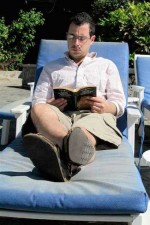Column Name
Title
Curious about the essential nature of things? Liberal Arts prof Aaron Jaffe, who’s been teaching at Juilliard since 2010, has offered electives on metaphysics and the psychology of the soul along with teaching the core requirements: ethics; society, politics, and culture; and arts and aesthetics courses. This spring, he’ll lead the 19th-century philosophy class, and he’s looking to fine-tune courses on alienation and friendship in the future. Born in Baltimore, Aaron grew up mostly in Silver Spring, Md., and Northbrook, Ill. He got his bachelor’s from Brandeis, where he majored in German cultural studies, history, and politics, and his Ph.D. from the New School last spring. His dissertation was called Alienation From “Species-Being”—An Investigation of Marx’s Philosophical Anthropology. Aaron and his partner, Lea, live in Flatbush, Brooklyn.
Body
Who was the teacher or mentor who most inspired you when you were growing up?
In high school I had an amazing chemistry teacher. I didn’t care about chemistry at all, and it didn’t come naturally to me, but the energy, passion, and commitment she brought to the classroom every day was incredibly motivating. She treated young adults with tremendous respect and held us accountable. I learned that deep concern, human decency, a trusting community, and high expectations can work magic in a classroom. [Interesting tidbit that’s tangentially related to this answer: Aaron’s high school, in Northbrook, Ill., was featured prominently in Ferris Bueller’s Day Off.]
Do you have a background in music, dance, or drama, and if so, are you actively pursuing it?
At various points in child- and young-adulthood I played trumpet, piano, and cello, but I never became even passably mediocre. I feel I ought to, but I am not actively advancing my less-than-modest natural capacities in music, dance, or drama.
If you suddenly had a few hours of free time, how would you spend it?
Probably waste too much of it marveling at my incredible fortune and then read the news or philosophy or call my loved ones. Or cook. It’s one of my few creative outlets, and there’s a reward at the end.
What’s the most satisfying aspect of teaching for you?
Hearing students ask better questions is immensely satisfying. Beyond course content, I always try to improve students’ relationships to difficult material. No matter where they start, when students begin asking higher-level questions, I know something is working and I get excited.
What’s the most frustrating aspect of teaching for you?
My students’ and my own time limits. I wish our investigation of ideas were as open-ended as the material requires and mutual interest allows.
How did you celebrate finishing your dissertation?
My parents flew into New York and took me, my closest friends, and my advisor out for dinner and drinks. We had a more family-centered celebration a bit later. I also got a tattoo.
If you could have your students read any book, what would it be and why?
I’m going to cheat here and say Plato’s collected works. They are absolutely foundational and many do a fine job motivating further inquiry. If you read Plato in some way as a dramatist and lover of ideas you cannot help but want to engage more.
If your students could only remember one thing from your teaching, what would you want it to be?
Developing one’s own critical thoughts in response to and following up on a slow, careful reading of a rich text is immensely valuable.
I understand you’re a Baltimore Orioles baseball fan. They’re currently in first place. What do you think their chances are of coming out on top this month?
I’m simply thrilled the Orioles are playing so well. My heart says this is their year but realistically, I think the Orioles’ chances to win it all are just about as good as any non-wild-card team that makes the playoffs.
What social media do you follow?
I’m on Facebook as a means to stay up to speed with current events and politics, to wish friends well, to engage in ill-advised debates, and to remain open to social invitations only delivered via that medium.
What would people be surprised to know about you?
I can eat more in a sitting than most think I would (or should) be capable of.
If you weren’t in the career you are in, what would you be doing?
Definitely something less academic. I think there’s great practical value to teaching philosophy, but perhaps something more socially engaged and concrete, although I’m not sure what that would be.





